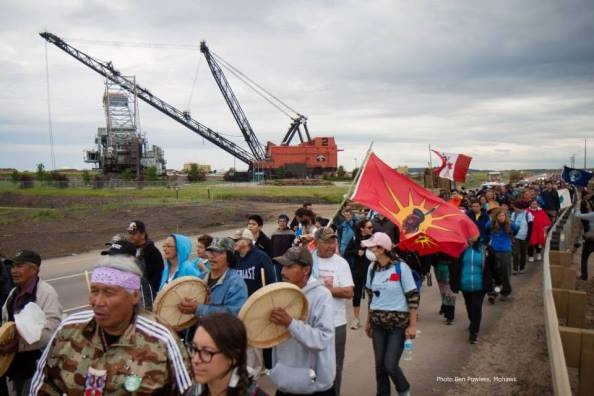Last week, accompanied by some dozen other Quebecois activists, I visited Fort McMurray, Alberta. This city, the global nerve centre of tar sands production, is a city like no other. What I saw and heard there moved me deeply, and the tragedy of Lac Megantic has only served to reinforce those feelings. I will be back.
Our flight from Montreal landed in Edmonton, and as we strolled through the airport, we passed a gift shop. On prominent display in the front of the store were a series of sweatshirts bearing the evocative slogan: “Got oil? Alberta oil!” It’s hard to know whether to be shocked or not, but here oil is truly a matter of national pride. As we drive into the heart of the city my initial impression is confirmed. SUVs and over-sized pick-up trucks are everywhere. The amusement park on the outskirts of Edmonton welcomes its visitors with a towering and triumphant replica of an oil rig.
The next morning I do an interview with Radio-Canada about our delegation. On social networks, reactions run hot: we are accused of interference, of seeking to destroy the economy of the province, of wanting to kill thousands of jobs. Our critics are not completely wrong. The Albertan economy is radically dependant upon oil: some 14 per cent of jobs derive from it … and 50 per cent of the province’s GDP.
Alberta is trapped in a vicious circle with no end in sight: the higher the price of oil rises, the more profitable the tar sands operations become, and the more the economy revolves around oil. It’s a cycle which seems ordained to never end. But what will become of the province once there are no more tar sands? No one here seems to ask the question. For now, they are enjoying the boom. And yet, the end is inevitable. The oil will be gone one day, and the fall will be brutal.
Alberta is an addict, and proud of it. In Quebec, the right refers to this province as a model of prosperity and development. The reality is quite different. Upon closer inspection, the ‘bad trips’ are both frequent and devastating.
The opposite of prosperity
The night before we leave for Fort McMurray, we meet a young medical resident who works in the trauma ward of a large Edmonton hospital. When she learns that we are driving up in the morning, her face changes. “You’re brave to drive, I would never take that road,” she tells us. Each week patients, mainly young men, end up in her emergency room as a result of accidents on this notoriously lethal stretch of road connecting Edmonton and Fort McMurray.
She tells us they share a depressing similarity of circumstance. “They’re drunk, they’re under the influence of all kinds of drugs, they’re suffering from STIs. The young people leave for the North as soon as they graduate, or sooner, to work in the sands. They make exorbitant salaries, more money than they know what to do with, so they get into drugs, and buying sex. Then they hit the road in their brand new truck after a night of partying, and, well, it never ends well.”
We hear the same story over and over again on our travels. The piles of money stacking up in Fort McMurray are high, but they do a poor job of hiding the human drama they produce. On paper, this is one of the richest regions of the country, but we keep bumping into indicators of a much different reality.
The highway in question is indeed one of the deadliest in the country, a veritable killing field for the young and virile who work in the oil sands. From 2006 to 2010, 93 people lost their lives and no fewer than 3,340 collisions were reported. The reasons why are fairly self-evident. Between February 1 and March 27, 2013, over 2,911 tickets were issued on this highway: speeding and reckless or impaired driving are the most common offences.
In the city, prostitution is at an all time high, with all the attendant problems of violence and public health. Fort McMurray is the Canadian capital of sexually transmitted diseases. The aboriginal and non-aboriginal worker communities are ravaged by AIDS, gonorrhoea and even syphilis, which has made an unlikely return. And of course these numbers do not take into account the women whom the sex trade leads here to serve a burgeoning and always frisky “clientele.”
Alberta is rich, we are told, as we are entreated to join them in their mad waltz of extractivism. We must seek out oil anywhere, and at any cost, they say, including on Anticosti Island. We are promised decades of prosperity, balanced budgets for our governments and a renewed sense of national pride in these “grand projects.” Less is said about the devastating effects of this avalanche of money on fragile local communities, primarily Indigenous. They are torn apart from the inside by alcohol, drugs, gambling, prostitution and violence. Albertans certainly do have big trucks and lots of oil, but is the game worth the cost of admission?
With these considerations in mind, we hit the road headed North. What we saw will mark us forever.
This is the first of a series of three texts on this extraordinary voyage.
Gabriel Nadeau-Dubois is the former co-spokesperson for Quebec student association CLASSE, and is currently studying Philosophy at the University of Montreal.
This article originally appeared in French on the Huffington Post Quebec. It is republished here with the author’s permission. Translation by Ethan Cox.
Photo: Ben Powless



